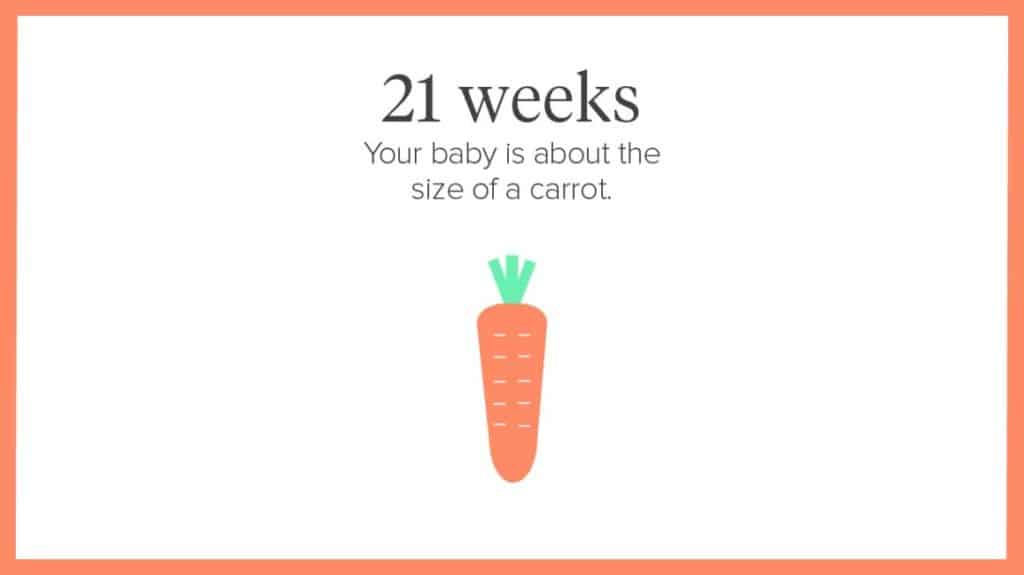
Table of Contents
Now that you are 21 weeks pregnant, you have still a long way to go in your pregnancy cycle. Being known about the symptoms, precautions and a lot of additional stuff is always useful. Your little munchkin weighs around 12 ounces that is 3/4 of a pound and the total growth is 10.5 inches long.This week you may experience some digestion problems. Let’s get into the article for a more detailed study about you, your body, and your child in the 21st week of your pregnancy.
21 Weeks Pregnant are How Many Months?
21 weeks pregnant in months mean you are in the middle of your fifth month of pregnancy. Pregnancy is generally considered to be around nine months long, with each month being approximately 4.3 weeks. You have roughly four more months to go until you reach full-term pregnancy at around 40 weeks. It’s common for people to use weeks rather than months for more accurate tracking during pregnancy.
So what else is happening to the baby in the 21st week of pregnancy?
You realize your baby is growing quickly, but how do you justify the big leap inches? Baby’s growth and development are being examined differently now.
1. Baby size
How does your child grow from 6.5 inches to 10.5 inches in a week? Baby’s development isn’t that insane—only it’s being calculated in different ways now. 21st week’s calculation switches from buttocks to face or from top to bottom. Your developing child is slowly beginning to spread out their limbs so that they can be assessed quite precisely through ultrasound.
2. Reproductive system
This may seem way too early, but your child is improving their potential to have children. Amazing right? Males are growing their testes, whereas females are creating their ovaries and all the eggs they would have in their lives—about a million.
3. Eyelids
In other facts about fetal growth, your baby’s eyelids are forming this week but it’ll require more time until they hit a cute blink.
4. Baby moving
Before those uterine walls begin to constrict, there’s ample room for twisting, turning, and even the occasional somersault. That’s what you experienced last night!
Considering all the belly dancing happening inside, it’s challenging to imagine your baby catching any sleep. Surprisingly, your fetus snoozes just as much as a newborn. If only you could enjoy some peaceful sleep as well!
Also, this week, if you were to press your belly, your baby would shy away since their skin has now started to respond to touches.
5. Baby's Taste Buds Grow
At 21 weeks of pregnancy, your baby’s taste buds are maturing. Your baby samples what you eat because they ingest a bit of amniotic fluid daily. This helps them practice essential swallowing and digestion skills, preparing them for life outside the womb.
Amniotic fluid tastes different each day, reflecting your diet. Your baby’s well-developed taste buds can detect this variety. Research suggests that these early taste experiences can influence their food preferences after birth. So, if you want your baby to love broccoli, start enjoying it now!
6. Baby's Developing Coordination
At 21 weeks pregnant, your baby is gaining coordination skills. Their arms and legs have reached a more proportional state, neural connections are established between the brain and muscles, and cartilage is gradually transforming into bone.
These enhancements provide your baby with better control over their limb movements, which is why you may be sensing increased kicking, stretching, and what feels like “belly surfing” as your little one practices their moves.
21 weeks Pregnant Symptoms
1. Fabulous nail
Now that you are halfway through your pregnancy, you’ll find a few fun side effects of you being pregnant, like good nails and luxurious hair. On the opposite hand, you would possibly end up battling heartburn or other physical pain. Here’s what is going on with you in the 21st week.
2. Heartburn and indigestion
All that growth additionally puts further pressure on your intestines and stomach, which may cause little troubling digestive symptoms. Try not to eat spicy and greasy foods, eat at least an hour before lying down and try to eat smaller meals—maybe 5 or six mini-meals rather than 3 massive ones every day. Most unlisted antacids are okay to take throughout the physiological state however talk and discuss this with your medical professional to be safe. Some pregnant ladies notice that uptake yogurt, drinking milk, or compounding a spoon of honey into heat milk helps to calm down the symptom. If your heartburn or stomach upset gets extremely unhealthy or doesn’t ease up regardless of what you do, speak along with your doctor.
3. Leaking breasts
You may be astonished to learn that your breasts are leaking when you’re pregnant. That liquid is not actually breast milk. It’s colostrum—a dense, yellowish, full of nutrients fluid that will be the newborn’s first meal for a couple of days if you plan to feed the baby.
4. Braxton Hicks contractions
If you experience pressure on your belly that often comes and fades away, you can feel these “fake” cramps. Braxton Hicks contractions are common at 21 weeks of age. Try to drink some water or change places if they trouble you. If they do not go away and become more regular, you can contact the healthcare professional if there is a real-serious contraction.
5. Stretch Marks
Around 21 weeks into your pregnancy, you may start noticing the appearance of stretch marks on your abdomen, buttocks, thighs, hips, and breasts. These streaks can be pink, red, purple, reddish-brown, or dark brown in color and develop as your body expands, especially when your tummy and breasts continue to grow. Stretch marks occur when the supporting tissue beneath your skin tears due to the stretching.
While estimates vary, at least half of pregnant women experience stretch marks. If your mother had them during her pregnancy, you’re more likely to develop them as well. Rapid weight gain can also increase the likelihood of stretch marks, so it’s a good idea to aim for gradual and steady weight gain, at an average of around one pound per week during this stage of pregnancy.
The appearance of stretch marks varies based on your skin complexion and genetics. Initially, they may be red, pink, or brown streaks, but over time, they tend to fade.
There’s no guaranteed way to prevent stretch marks. However, applying moisturizers like cocoa butter can help keep your skin hydrated and alleviate dryness and itching associated with pregnancy-related skin stretching. After giving birth, these marks usually become less noticeable.
6. Alleviating Pregnancy Anxiety
As your pregnancy becomes more evident, and those little kicks unmistakably announce your baby’s presence, the reality of becoming a parent may be setting in. It’s natural to experience a mix of emotions, some of which you might feel uncertain or anxious about sharing. Thoughts like “Am I really going to be a mom?” can creep in.
It’s important to remember that virtually every expectant parent, at some point, begins to feel anxiety and fear, as if they’re on a rollercoaster ride of life-changing events. These emotions are not only normal but also healthy to acknowledge. Don’t hesitate to open up about your feelings with friends who have experienced parenthood; they can offer reassurance by sharing similar thoughts and concerns. Most importantly, have a heart-to-heart conversation with your partner, if you have one, as they are likely experiencing their own emotions and can provide invaluable support.
7. Gassiness and Abdominal Discomfort
As your uterus exerts more pressure on your rectum, you might find it challenging to control gas. To alleviate this discomfort, ensure you stay well-hydrated and include fiber-rich foods in your diet. This can help prevent constipation, which often exacerbates gassiness.
8. Back Pain
Your changing center of gravity and the hormone relaxin, which is causing your ligaments and joints to stretch and loosen, can lead to increased discomfort in your back. If possible, consider indulging in a prenatal massage administered by a qualified professional and invest in a pair of supportive shoes to help alleviate the strain.
9. Bleeding Gums
When your gums are inflamed and bleeding, causing your toothbrush to turn pink, it’s advisable to steer clear of sticky candies, especially if you can’t brush your teeth right after consuming them. These sugary treats can boost the presence of bacteria in your mouth and exacerbate gum irritation.
What would your 21 weeks pregnant belly look like?
At 21 weeks of pregnancy, the bodyweight increases around one pound a week and is predicted to increase. Your pregnant belly is increasing steadily you can feel about a half-inch over your belly button at the top of your uterus using your hands.
You can systematically evaluate your fundal height at your Gynecologist consultations—the gap between both the pubic bone and the upper side of your uterus. It enables monitoring of the child’s growth and amniotic fluid amount.
These were the 21 weeks pregnant symptoms. Now, let us give you some tips for smooth sailing during your 5th month.
Tips For You
1.Elevate Your Feet
Struggling to tie your shoes due to swollen feet and ankles? You’re not alone. With your body now containing about 50 percent more blood and fluid than before pregnancy, it’s natural for your extremities to swell. Therefore, don’t hesitate to take breaks and elevate your feet a few times during the day.
2.Go for a Stroll
Walking can be your remedy if you are constipated. Whether you’re pregnant or in the early postpartum period, engaging in physical activity, such as a brisk walk, is a highly effective method to promote bowel movement and combat constipation.
Even just half an hour of walking daily (or 30 minutes spread out in shorter segments) can make a significant difference, especially when combined with proper hydration and a diet rich in fiber.
Don’t forget to pack some trail mix for your walk. Furthermore, beyond addressing constipation and other pregnancy symptoms, walking is an excellent way to maintain your necessary exercise routine during pregnancy.
3.Take a Dip in the Pool
Seeking relief from your sore muscles and joints? Consider a refreshing swim. In the water, your body weight is reduced to just a fraction of what it is on land, making you feel lighter and more agile. An added benefit is that many women find the cool water soothing for pregnancy-related stomach discomfort.
However, exercise caution when you’re on the pool deck. The surface can be slippery, and combined with your growing belly, it may affect your balance.
4.Relieve Nasal Congestion
Not all that stuffiness in your nose is necessarily due to seasonal allergies. Unfortunately, from the second trimester onward, nasal congestion becomes a common pregnancy symptom that often persists until delivery. It can lead to sleep disturbances and even trigger a new habit of snoring.
To alleviate the congestion, try closing one nostril with your thumb and gently blowing out the other, then repeat on the opposite side.
If your congestion is severe, consult your doctor to inquire about safe over-the-counter decongestants or antihistamines. Additionally, nasal strips can provide relief.
Concluding Thoughts
Now that your baby has started to show prominent movements, you could feel a bit overwhelmed and anxious for its arrival. Don’t worry everything will be fine, all you need to do right now is to be calmed and relax and most importantly be happy as much as you can.





